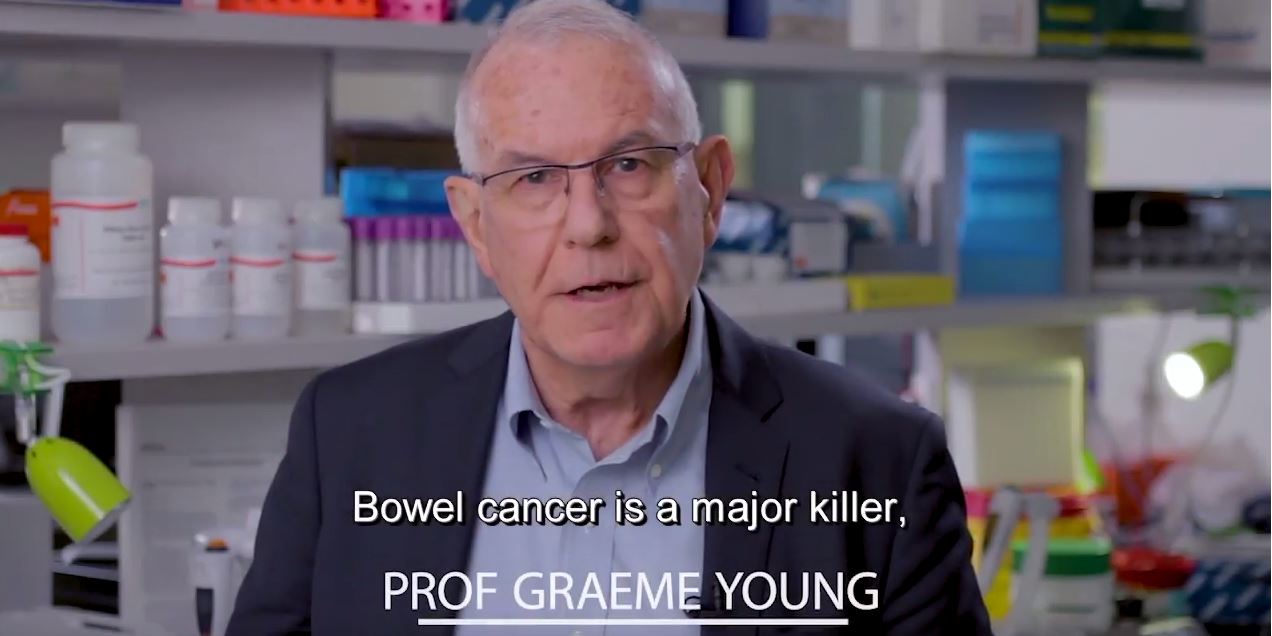
Tens of thousands are likely to be saved by an early blood test for recurrent bowel cancer – a test case in commercialisation of Australian research.
The Colvera test, developed from earlier research led by Matthew Flinders Distinguished Professor in Gastroenterology Graeme Young, has won the 2017 Australian Johnson & Johnson Eureka Prize for Innovation in Medical Research.
The Australian Museum Eureka Prizes reward excellence in the fields of research and innovation, leadership, science engagement and school science.
Australian trials of the test, along with other colorectal cancer and a myriad of other major research work, will be on showcased at the Flinders Health Research Week (4-8 September).
The public is invited to learn more at Research Week presentations to be held at lecture theatres at a range of southern Adelaide venues including the Flinders Centre for Innovation in Cancer, Flinders Medical Centre, Flinders University, Tonsley Innovation Precinct and Noarlunga Hospital . See the program in detail here
Bowel cancer, also known as colorectal cancer (CRC), is the second most common cause of death from cancer in Australia, with over 16,500 new cases diagnosed annually. It is responsible for more than 600,000 deaths worldwide each year.
The Colvera Team has developed a clinically validated blood test that sensitively and accurately detects cancer DNA in the blood plasma of colorectal cancer patients. This presents a new opportunity for oncologists to improve treatment regimens through earlier disease detection that may in turn lead to increased patient survival.
The Colvera technology is a clinically validated blood test to detect cancer in the blood plasma which will soon be available in Australia after recent trials in the US.
Developed in collaboration with CSIRO, biotech company Clinical Genomics Pty Ltd and Flinders University, the new blood test is twice as effective as existing non-invasive blood testing methods at detecting recurrent bowel cancer.
Professor Young’s earlier work at the Flinders Centre for Innovation in Cancer helped to establish the Australian National Bowel Cancer Screening Program, which seeks to make early detection of colorectal cancers in people aged over 50 years old.
The Colvera™ test, which became commercially available in the United States last year, detects recurrent disease in patients previously treated for bowel cancer.
Clinical Genomics chief executive Dr Lawrence LaPointe says the Colvera test is a test case in the commercialisation of Australian research.
“This is a real success story of science partnering with industry to create impact, and has provided an excellent learning opportunity for Australian researchers to see science being applied with a business and intense product focus,” Dr LaPointe says.
Clinical Genomics is a privately held biotechnology company developing innovative products for CRC diagnosis.
Key to the Colvera test are markers, discovered by scientists from CSIRO, Flinders University and Australian biotechnology company, Clinical Genomics, that indicate appearance of circulating tumour DNA in blood.
The test, which is twice as sensitive in detecting these recurrent tumours as current tests, means that these patients are picked up earlier, increasing their chances of being cured.
Post-surgical recurrence of CRC occurs in 25 to 40 percent of cases, most often in the first three years following initial diagnosis and treatment. Around 2000 Australians each year have their bowel cancer return once they have had treatment and given the “all clear”.
The current method for monitoring recurrence is via a blood test for carcinoembryonic antigen (CEA) in combination with CT scans and other clinical assessments. CEA is a widely known marker for gastrointestinal tract diseases, especially CRC, however it has low sensitivity and is subject to false-positive results, limiting its usefulness.
CSIRO lead scientist Dr Peter Molloy says the changes detected by the Colvera occur in more than 90% of colorectal cancers and show very low background in plasma of people without cancer.
Lead clinical investigator Professor Young stresses that early detection is key in defeating recurrent bowel cancer.
“One of the principles in managing bowel cancer is, the smaller the tumour, the earlier you get it, the better the recovery,” Professor Young says.
“Colvera allows us to detect recurrent bowel cancer at an earlier stage and when it is at a smaller size.”
He also will present on the new blood test technology at the 25th United European Gastroenterology Conference in Spain in October. He was represented at the Eureka Prizes night at Sydney Town Hall last night by Matthew Flinders Distinguished Professor and Dean (Research) of the College of Medicine and Public Health, Professor Ross McKinnon, who holds a Beat Cancer Professorial position and is Director of the Centre for Innovation in Cancer (FCIC) at Bedford Park.

